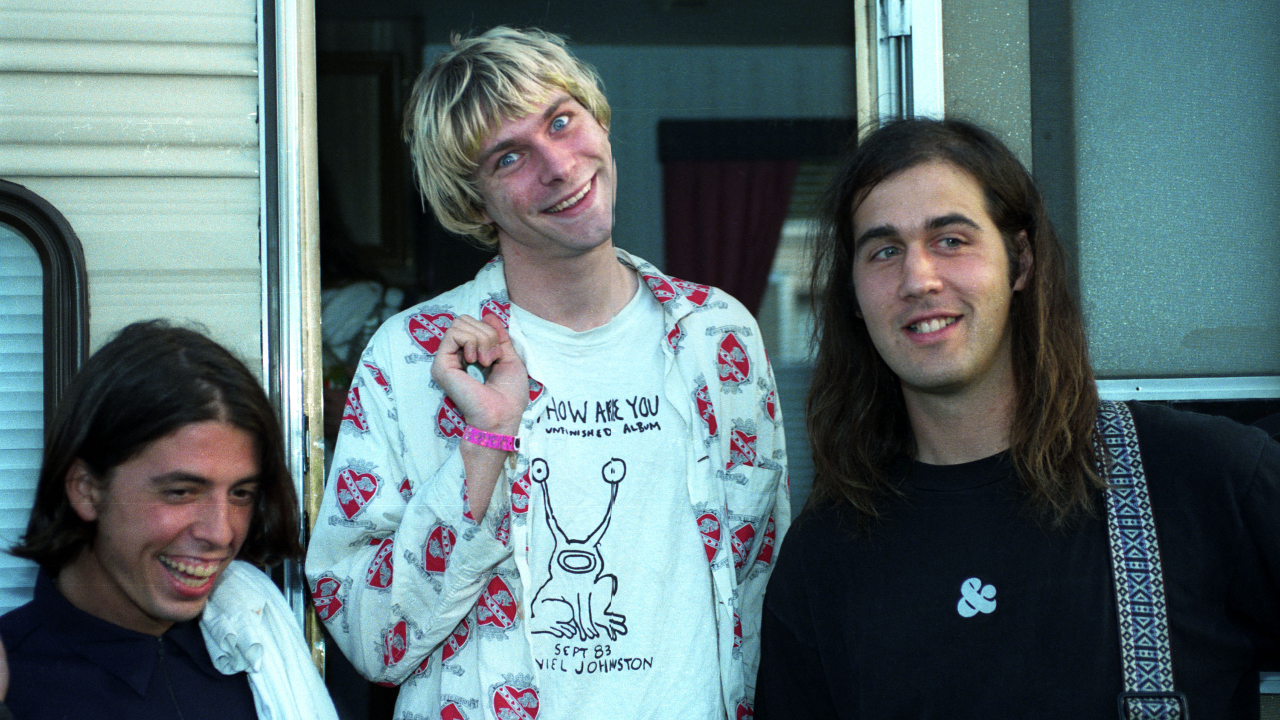"Sometimes performing on stage with her could be a transcendent experience": the triumph, trauma and tragedy of Sandy Denny
With one of the most captivating voices of her era, Sandy Denny seemed assured of major success. But insecurity, mistakes and finally tragedy meant she never fulfilled her potential

Select the newsletters you’d like to receive. Then, add your email to sign up.
You are now subscribed
Your newsletter sign-up was successful
Want to add more newsletters?

Every Friday
Louder
Louder’s weekly newsletter is jam-packed with the team’s personal highlights from the last seven days, including features, breaking news, reviews and tons of juicy exclusives from the world of alternative music.

Every Friday
Classic Rock
The Classic Rock newsletter is an essential read for the discerning rock fan. Every week we bring you the news, reviews and the very best features and interviews from our extensive archive. Written by rock fans for rock fans.

Every Friday
Metal Hammer
For the last four decades Metal Hammer has been the world’s greatest metal magazine. Created by metalheads for metalheads, ‘Hammer takes you behind the scenes, closer to the action, and nearer to the bands that you love the most.

Every Friday
Prog
The Prog newsletter brings you the very best of Prog Magazine and our website, every Friday. We'll deliver you the very latest news from the Prog universe, informative features and archive material from Prog’s impressive vault.
Bassist Ashley Hutchings spent not much more than a year playing with Sandy Denny in Fairport Convention, but he has been asked to talk about her for four decades now. Hutchings believed he had said everything he possibly could on the subject, but on this late winter’s afternoon it occurs to him that there is one acute memory he hasn’t yet shared of the extraordinary woman who fronted Fairport for just a fleeting period in 1968 and ’69.
When Denny joined Fairport she was a 21-year-old folk singer, rich with promise but little-known. Hutchings, at 23, was the band’s bassist and elder statesman. Fairport were taking baby steps on London’s underground club circuit, sharing bills with the nascent Pink Floyd and in thrall to the acid-rock sound blown in from the American West Coast. Her arrival in the group was their catalyst for change, since she brought along with her an appreciation of traditional English song and could sing a hushed ballad like an angel, and roaring rock with all the bruised guts of Janis Joplin. By the by, she was loud, erratic, funny, needy prone to veering mood swings; a pocket dynamo in every respect. The five nice, polite, middle-class English lads she joined in the band hadn’t encountered anyone quite like her. But then nor had anyone else.
In the rush of one helter-skelter year, Fairport made three albums with Denny that birthed British folk rock, the effects spreading out like ripples across a pool. There was also tragedy. Returning to London from a gig in Birmingham in May 1969, the band’s van crashed on the M1. Drummer Martin Lamble, just 19, and guitarist Richard Thompson’s girlfriend, Jeannie Franklyn, were killed instantly. Denny had travelled home separately that night, but like the others, she was weighed down by a terrible sense of loss and survivor’s guilt.
After she left Fairport in December ’69, impulsively, messily, Denny’s course was wayward. Troubled by self-doubt and insecurities, she was never able for long to give full vent to her blazing talent. She flickered instead, like a candle burning in a draughty room, becoming best known for the bewitching spell she cast singing with Robert Plant on Led Zeppelin’s The Battle of Evermore, although it was a mere cameo.
It’s some time in Britain in 1977, the year of drought, Silver Jubilee street parties and punk rock, and the scene is a café-bar in West London. The place is all bustle and chatter when Hutchings walks in off the street, but one voice stands out. He hasn’t even thought of running into Denny, has scarcely seen her in eight years. Yet there she is, at a table with a handful of people Hutchings doesn’t recognise, larger than life and, as she so often made herself, the centre of attention.
“She had been drinking, of course,” Hutchings recalls of their encounter. “And when she saw me she said: ‘Oh, Ashley, come and kiss my hand.’ She held out a hand for me. Well, she was just drunk, that’s fair enough. But I didn’t make a joke of it, like I should. I walked away instead, rejected her. That was the last time that I saw her, and it’s haunted me a bit ever since.”

Born Alexandra Elene MacLean Denny on January 6, 1947, into a comfortably-off household in Wimbledon, South London, Sandy’s roots on her father’s side were Scottish. Her father, a civil servant, encouraged his precocious daughter to recite from Songs Of The Hebrides, which he kept around the house. Her paternal grandmother would sing to her the ballads she herself had been taught growing up on the Isle of Mull. As a child, Sandy took piano and violin lessons. When as a teenager she picked up her elder brother David’s guitar, she was diligent enough at the instrument to convince her father to buy her one of her own.
Sign up below to get the latest from Classic Rock, plus exclusive special offers, direct to your inbox!
Neil Denny was by all accounts otherwise a rather aloof and distant man, his wife Edna sharp-tongued and chiding. Prim and slim, Sandy’s mother would rebuke her for being dumpy, sowing seeds that festered for all of her short life. At Coombe Girls’ Grammar, Sandy was a restless, uninspired student. She played lead violin in the school orchestra and gained five ‘O’ Levels, music included. But she found her true calling on the local folk club circuit, which at the time was enjoying something of a boom.
As the young Bob Dylan and Joan Baez were becoming required listening among British hipsters, folk clubs and folk nights sprung up all along the Thames and around Soho in London. At 15, Denny discovered Kingston Barge, a bellwether club founded in 1961 on a converted coal barge. It was here that another local lad, John Martyn, would debut, and also where visiting American songwriter Paul Simon did a regular turn. Denny plucked up the courage to sing floor spots at the Barge and other nearby clubs, most often something by Dylan or Baez.
In the interim between leaving school and taking up a place at Kingston Art School, Denny took a temporary job as a nurse at the Royal Brompton Hospital in Kensington. The work was menial and a drudge, but the hospital was next door to London’s self-styled ‘oldest folk club’, the Troubadour on Old Brompton Road. On Tuesday nights at the end of her shift, she would walk along to the Troubadour and into a whole other world.
Linda Peters (later Linda Thompson), a fellow Troubadour habituate, recalled to Denny’s biographer Mick Houghton how “she used to come down straight from the hospital with all sorts of drugs stashed in her pockets that she had stolen from patients – uppers, downers, sleeping pills. Then she’d get up on stage and be amazing from the get-go.”
When Denny let loose her voice, the effect was transformative. It was as if others beheld her in a dazzling new light, a body apart from the awkward, unprepossessing girl in a nurse’s uniform. For her own part, singing was something that filled her up, gave her a feeling of being set free. Beginning art school, she was introduced to a new club, Les Cousins, that opened up in a basement coffee shop on Soho’s Greek Street. It was soon hosting the cream of the new folk talent bubbling up in London, among them Roy Harper, Ralph McTell and Al Stewart.
On October 27, 1965, Denny shared a bill there with Paul Simon and another transplanted American, a brooding, self-destructive character named Jackson C Frank. Shortly after, she fell into a relationship with Frank that set what would become a familiar pattern for her. Which is to say it was tempestuous and brief.
Through the fullness of the next year, folk also got launched to the forefront of pop culture. In America, Dylan plugged in, The Byrds jangled and prodigal son Simon hit pay dirt with The Sound of Silence, while the 19-year-old Donovan broke out in Britain. In this hothouse atmosphere, Denny started to pick up club engagements across the country. She broke up from her first year at art school in the summer of 1966 and never went back.
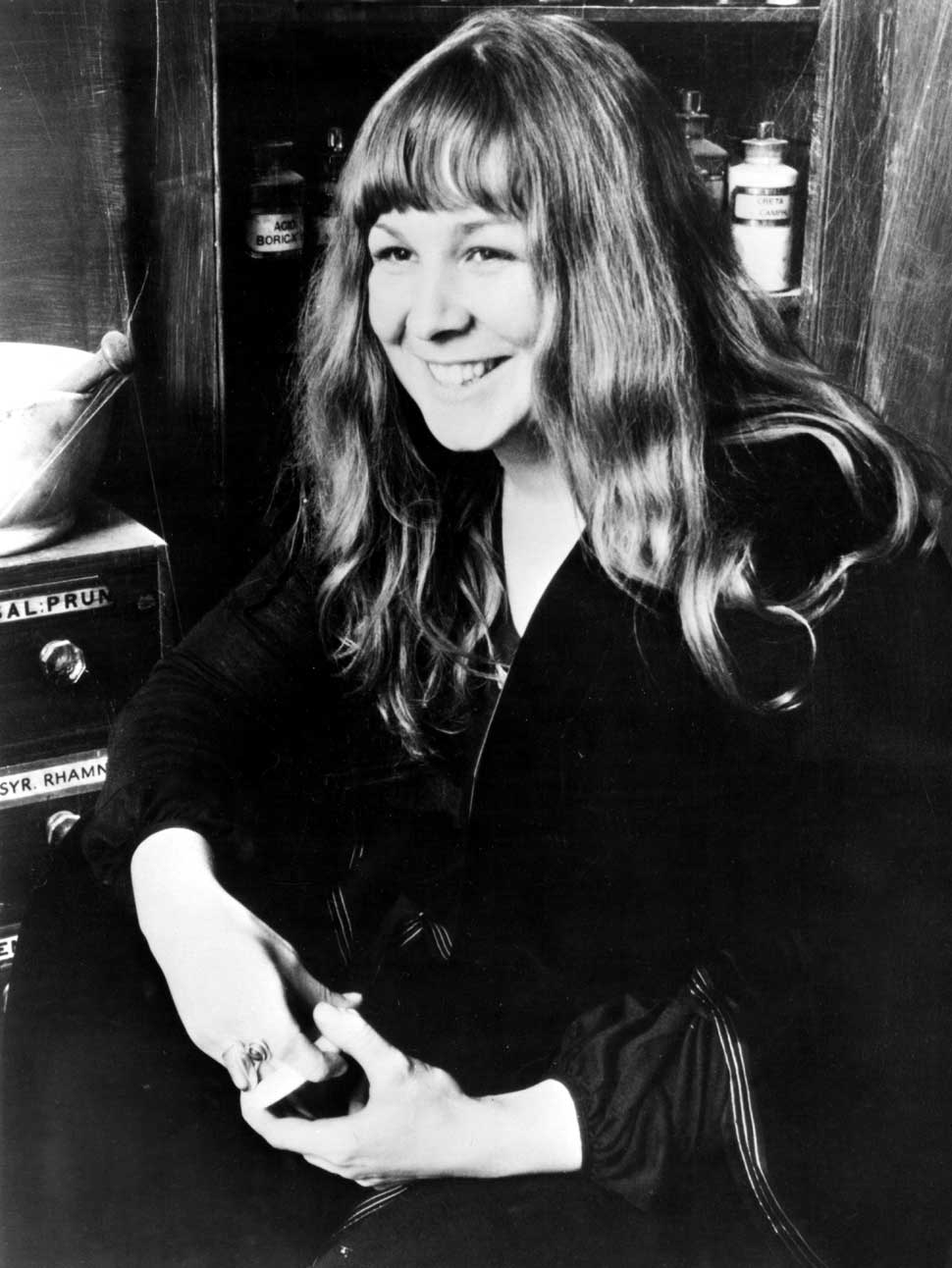
By early 1967, Denny was pulling in good money as a full-time musician. Fronting for a couple of folk stalwarts, Johnny Silvio and Alex Campbell, she also made her first two records: Sandy & Johnny and Alex Campbell & His Friends. Neither made any real impression. However, Denny’s bolstered confidence helped her to make her next move, which was to hook up with the already established band The Strawbs.
Formed in 1964 as a bluegrass group, The Strawbs had shifted towards a more English sound by the time their principal member, Dave Cousins, spotted Denny singing at the Troubadour. During her year-long tenure with them, the band played just a handful of shows, but among these was a weeklong club residency in Copenhagen in the summer of 1967.
While in the Danish capital, The Strawbs recorded their first album, All Our Own Work, although it would go unreleased for six years. As the title implied, it was made up of 12 original songs, most slight and written by Cousins, but with one exception. Put down with just guitar and Denny’s voice, Who Knows Where the Time Goes? was a graceful, lilting ballad. The first song of her own that she felt emboldened enough to share, hindsight has made it sound almost unbearably poignant.
Within a year, the American folk singer Judy Collins had picked up on Denny’s song and made it the title track of her new album. By then, Denny was out of The Strawbs and on the verge of joining Fairport. She had run into their manager/producer, a laconic 25-year-old called Joe Boyd, on the London club scene. Boyd had advised her against signing a recording contract with The Strawbs, stymying their album and doubtless with his charges in mind. Fairport had not long completed their debut LP, with singer Judy Dyble, whose voice was pretty but insubstantial and whom Boyd wanted out of the band. They had added a second singer, Ian Matthews, to support Dyble, but by the spring of 1968 they decided to cut her loose.
On May 13, Boyd arranged for Fairport to audition for a replacement in the back room of a pub in Fulham. Six girls turned up on the day, Denny among them. Neither Ashley Hutchings nor Richard Thompson can recall Boyd marking their card about her, but she struck them instantaneously enough that they offered her the job on the spot.
“Sandy was head and shoulders above the rest,” says Hutchings. “She breezed in and kind of took over. She didn’t just want to sing for us, she also wanted us to play for her and to see if we were good enough.”
“She was one of the best singers I’d ever heard in my life,” Thompson continues. “As a personality she seemed bubbly, insecure, short-tempered and a lot of fun, and all of those things together. The immediate impact she had, I think, was that at last we felt that we were a real band.”
That summer, the new-look Fairport Convention did a number of festival dates around the UK, including the Isle of Wight and a free affair on London’s Hampstead Heath with Jefferson Airplane. Fairport had been strongly influenced by the American band, and now they too had a captivating, formidable woman fronting them. Just like the Airplane’s Grace Slick, Denny could hail the sirens but also bring a room to a reverential hush.
In July, Fairport began the sessions for a new album with Boyd. At a stroke on What We Did On Our Holidays, the band sounded more assured and forceful. Individually, Thompson, Hutchings, Lamble and second guitarist Simon Nicol were all excellent musicians, but with Denny they now had a vessel through which to channel a collective power. For Boyd at least, the pace and ease at which the band moved with their new singer was both a blessing and a relief.
“Temperamentally she was very, very different from them,” Boyd told Denny’s other biographer, Clinton Heylin. “Sandy was a very loud, rather raucous person with a broad and bawdy wit, sometimes a foul tongue, not known to be a cautious drinker. I was afraid that she was going to chew them up and spit them out for breakfast.”
“Sandy was also in a different culture to the rest of us,” adds Hutchings. “She liked a drink, or ten, and took drugs – soft ones mostly, I think – and we didn’t. We weren’t ‘in’ with her drinking buddies, but we loved her dearly.
“On stage, she was sensationally good. She would open her mouth to sing, say, a slow, gentle song, and you could hear a pin drop. Travelling in the van, she would always sit next to me and fall off to sleep with her head on my shoulder. That’s an image of her that I treasure.”
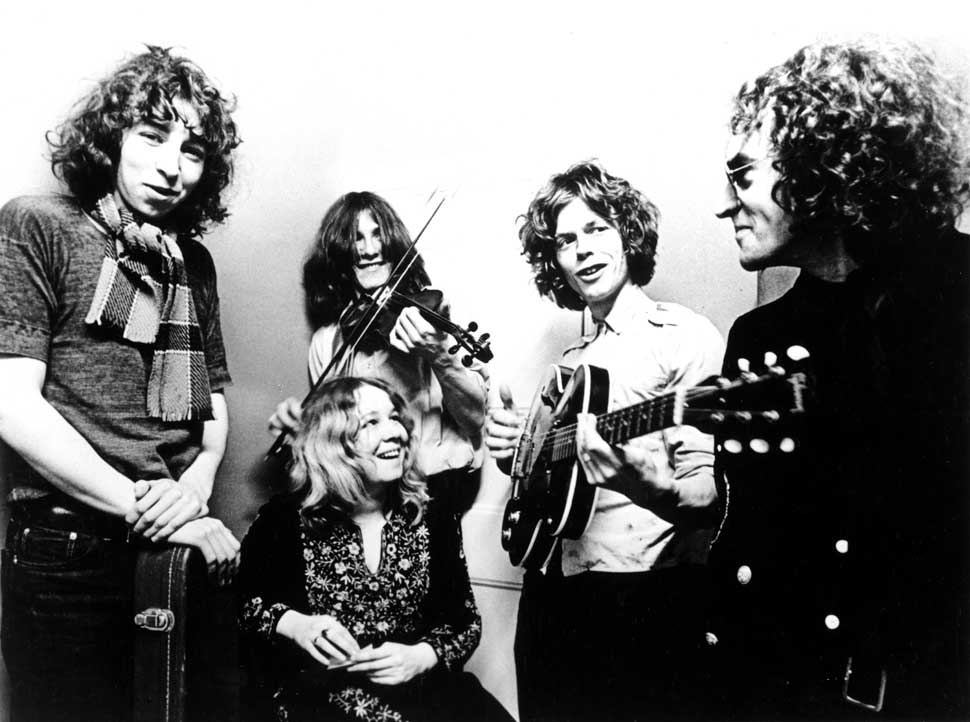
These were heady times, and there was no pause to catch breath. No sooner was their second album done and dusted than Fairport were into the making of their third, Unhalfbricking. Now, Denny truly asserted herself. She gave the band Who Knows Where The Time Goes?, nailing this version in one take, and brought in a second song, Autopsy, that was just as seductive.
It was her suggestion to reimagine Dylan’s If You Gotta Go, Go Now in French, as Si Tu Dois Partir. Fairport’s version became a freak hit, landing them on Top Of The Pops, Denny in a floral dress, the others in berets and hooped jumpers, altogether an experience she claimed to have despised. A second Dylan cover, Percy’s Song, was the only track on the album to feature Matthews. Deemed surplus to requirements, he was let go.
Even the album title and artwork bore Denny’s imprint. ‘Unhalfbricking’ was a typical nonsense word that she came up with during a word game. When it came to shoot a photograph for the album cover, and also characteristically on the spur of the moment, she posited the idea of the band in the garden of her childhood home.
Perhaps her greatest contribution to the record, though, was to bring in A Sailor’s Life, a traditional song she had picked up on the folk circuit. Fairport’s version unwound over a bravura 11-plus minutes, Thompson’s guitar spirals and the flashing fiddle of session player Dave Swarbrick spiriting the listener off to more exotic, Eastern climes, Denny’s vocal torch song exquisite. Here was the telegraph announcing where Fairport Convention would next roam.
On May 11, 1969, two months ahead of the album’s release, while driving back to London from Birmingham club Mothers the band’s van hit a crash barrier and rolled down the embankment, scattering the occupants. Lamble and Franklyn died on impact; Hutchings was left temporarily blinded and with a shattered pelvis. Denny had gone on ahead with her new boyfriend, guitarist Trevor Lucas, whose band Eclection had opened for Fairport that night.
“She was completely shell-shocked,” Linda Thompson related to Mick Houghton. “I never really heard Sandy say anything about the crash, nor Richard, nor anyone from the band. We bottled things up back then; stiff upper lip and all that.”
Despite the tragedy, Fairport didn’t throw in the towel, as if doing so would make the events of that fateful night too awful to bear. Once Hutchings was out of hospital, they retreated to rural Hampshire and the restorative confines of a 19th-century rectory, Farley House. Joining them there were Swarbrick, now a full-time member, and Lamble’s replacement, Dave Mattacks, whose background was in big-band jazz.
Summer passed into autumn, Unhalfbricking came and went, and out the other side Fairport emerged with a new record that delved back deep into the English song tradition, but to zoom it off to a reimagined, electrified present. Unloved at the time, simply too much of a shift, Liege & Lief’s stature has grown over the years. On a record that sounded at once ages old and newborn, Denny took on staples such as Reynardine and Matty Groves and wrung them for pathos and drama. In total, the results were thrilling, magic captured in a bottle.
“It was a concentrated period for everyone,” recalls Hutchings. “The instruments were permanently set up in the big living room and we literally worked every day. Privately, we grieved, but no one had any counselling, and so it came out in dribs and drabs. Also, there was a need for us to relax and be happy. No one before had ever played these songs with a rhythm section, so it was hard work too, but Sandy probably adjusted quicker than anyone else. All through the making of that record, she was like a breeze.”
But Liege & Lief proved to be a last hurrah. Hutchings wanted Fairport to carry on digging for lost treasure, but Denny had a stockpile of her own songs. She didn’t want to have to tour apart from Lucas, not least because he had a reputation as an incorrigible ladies’ man and she didn’t trust him not to stray. That November, after an emotional return gig at Mothers, she served her bandmates notice that she was quitting Fairport.
“It had crossed our minds that Sandy and Trevor would want to be in a band together,” says Richard Thompson. “But it was such an uncomfortable thought for us that we kind of shoved it to the back of our minds, so it was still a shock when Sandy left. You also have to remember, hanging over this whole time was the fact we were all still traumatised by the accident. In some ways, all of our actions and perspectives were warped by that.”
Unmoored from Fairport, Denny never really got her bearings back. To a greater extent she drifted, allowing herself to be pushed along by one current after another, until she began to flail, then drown. Boyd begged her to make a solo album off the bat, securing for her a £40,000 advance from A&M Records in the US. She flatly refused, and instead used A&M’s money to fund the group, Fotheringay, that she hastily assembled with Lucas. Soon enough the five-piece were burning through her money, most wastefully on having an enormous PA built that they ended up hardly using.
Joe Boyd produced their self-titled debut album of 1970, which gloried in a handful of the most outstanding vocals Denny was ever to commit to tape, but the band played just a smattering of shows to promote it. One of these was an ill-starred headliner at the Royal Albert Hall that October, at which Denny appeared paralysed by nerves and the band as a whole got blown off stage by their attention-grabbing opening act, a young Elton John.
Fotheringay’s second album, begun the following year, was never completed. In Denny’s account, Boyd was relentlessly pressuring her to go solo. When he got offered an executive posting at Warner Brothers Records in Los Angeles, she claimed he promised he would turn it down if she would kill off Fotheringay and make her own record with him. She obliged with the band, but Boyd, who has long disputed her version of events, upped and left regardless. Either way, the upshot was that she lost a champion, and just when she needed one most.
She called on another, former Fairport bandmate Richard Thompson, to guide her through her solo debut, The North Star Grassman And The Ravens, which she recorded in spring 1971. It seems now a reflection of her mood at the time, the songs and her vocals sombre and subdued. It was not an easy record to extract from her, or one to elevate her out of the folk niche.
“Sometimes she would coast through a session,” says Thompson. “She would know something was missing and be dissatisfied, but it was almost like she had to have an absolute deadline to force her to produce the goods. It was also a tough record in the sense that Sandy wrote songs that were very one-paced. That created a certain atmosphere, but got to be repetitive.
“But on the tour we did for that record, she was the most stable that I ever saw her. When I think of Sandy now, it’s always of her laughing and giggling. She could be great fun, and sometimes performing on stage with her could be a transcendent experience.”
This state of equilibrium was not to last. Lucas took over as producer for her next record, Sandy, an often sublime, stately collection. Island Records had high hopes for it, even going so far as to have famed photographer David Bailey shoot her portrait for the cover, but it was a flop.
After that, under Lucas’s steerage, Denny tried for a kind of sepia-tinted whimsy on Like An Old Fashioned Waltz, an album shaded in strings and brass punctuations. That one flopped too, although it did feature one of her loveliest songs, Friends, which was inspired by an unconsummated liaison with Pete Townshend.
“Sandy was insecure about her looks, her appearance sometimes,” notes Thompson. “I thought she was pretty, and a lot of men loved and chased her, but they weren’t the ones she wanted. She wanted these unobtainable men. She got to be insecure about her career, too, and probably thought she had to bend. And when you start trying to fit a different mould, the risk is that you lose whatever individuality you had.”
Added to this, her relationship with Lucas, always on a knife edge, had become even more fractious and damaging, exacerbated by the fact that he had been signed up by Fairport as a guitarist and was all too often out of her sight. The two great plunges she took before Like An Old Fashioned Waltz had even come to appear now like last-ditch attempts to fend off further psychic bruising. In the first instance, in September 1973, she and Lucas got married. Her appalled father refused to attend. Secondly, she rejoined Fairport.
“Sandy was really lovely, but there were quite a lot of rumours going around that she was having a tough time,” says Gered Mankowitz, who photographed her for the Waltz album cover. “Trevor Lucas wasn’t at the shoot, but it was clear to all of us that knew her that there was a tremendous amount of friction between the two of them. There were ghastly stories about them, how they both used to get drunk and abuse each other.”
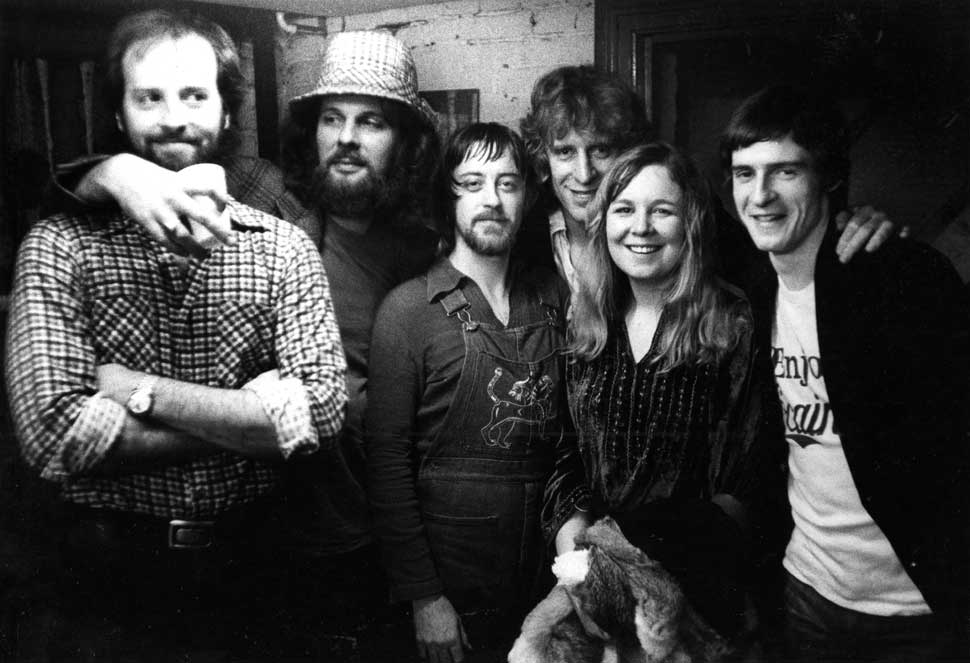
After the wedding, the couple moved from London to an old country cottage, The Twistle, in the Northamptonshire village of Byfield. Rather than being a sanctuary, for Denny it would become more of a prison. Back in Fairport, she did at least get to work with a producer who fired her up again.
Island’s last throw of the dice to break the band internationally, for the Rising For The Moon album, the label stumped up for Glyn Johns, renowned for marshalling the Rolling Stones, the Eagles, Zeppelin and The Who. A strict, unyielding taskmaster, Johns brooked no nonsense and got the very best out of Denny. Pushed hard, she poured her soul into the record, but it rose no higher than No.143 on the US chart.
“Sandy wasn’t in a good place and was starting to slide, but she really delivered on that record,” says drummer Dave Mattacks, who nevertheless left Fairport midway through the recording and missed the arduous tour that followed. “I had just had enough of banging my head against the wall. Basically, nobody was really interested in folk rock, for want of a better term. That also contributed to Sandy’s difficulties. Had there been some real success, I don’t believe things would have gone the way they did.”
“Those long tours were gruelling and everybody could see that she wasn’t happy in herself,” adds Dave Pegg, who took over from Hutchings on bass. “There were nights when she would play bum notes on the piano.”
Fairport came home from the tour in a parlous financial state, and Denny left the band for a second time. She retreated to The Twistle. Her drinking escalated, and her black moods got deeper. She began to make another solo record with Lucas, intent upon aiming at a more contemporary sound, but her voice was showing the strain, and often as not she would turn up to the studio late, if at all. Yet still she was capable of moments of wonder, such as on the haunted song No More Sad Refrains that would end up closing the album.
She delivered the record, which she had called Gold Dust, to Island in the summer of 1976, but the label shelved it, with no one quite sure what to do with it, or her, any more. It would be 10 months before it finally got a release, Island having coerced Denny into adding to it a perfunctory cover of Elton John’s Candle In The Wind, on which she sounded somnambulant, and retitling it Rendezvous. Arriving as punk blew up, it vanished into an abyss and Island let go of her like yesterday’s news.
At the beginning of 1977, Denny found out she was pregnant. She had often spoken to friends of wanting to have a child, but impending motherhood didn’t rein her in. Georgia Rose MacLean was born on July 12 ,1977, three months premature. She was kept in an incubator in hospital for two months, effectively to be detoxed. Denny was no more able to look after her baby when she at last took her home.
“When Georgia came along we all thought it was going to be great for her and would make her happy, but it didn’t,” says Dave Pegg. “She and Trevor were having serious problems, and that caused an awful lot of grief.”
“At that point, I would see her sporadically and I was distressed when I did,” adds Richard Thompson. “She was drinking more, doing more drugs, and I would have a really bad feeling that some potential tragic outcome was on the cards. Sandy was a mess. Her baby needed protecting. But even in a situation like that, people have to come to their own realisation.”
Denny managed one final tour of the UK that November. Attendances were erratic, and so were her performances. The following March she took Georgia to visit her parents at their holiday cottage in Cornwall. One afternoon, coming downstairs, she stumbled and fell, hitting her head on a stone floor. Afterwards she told friends that her mother had refused to take her to hospital, not wanting to be seen with a drunken daughter.
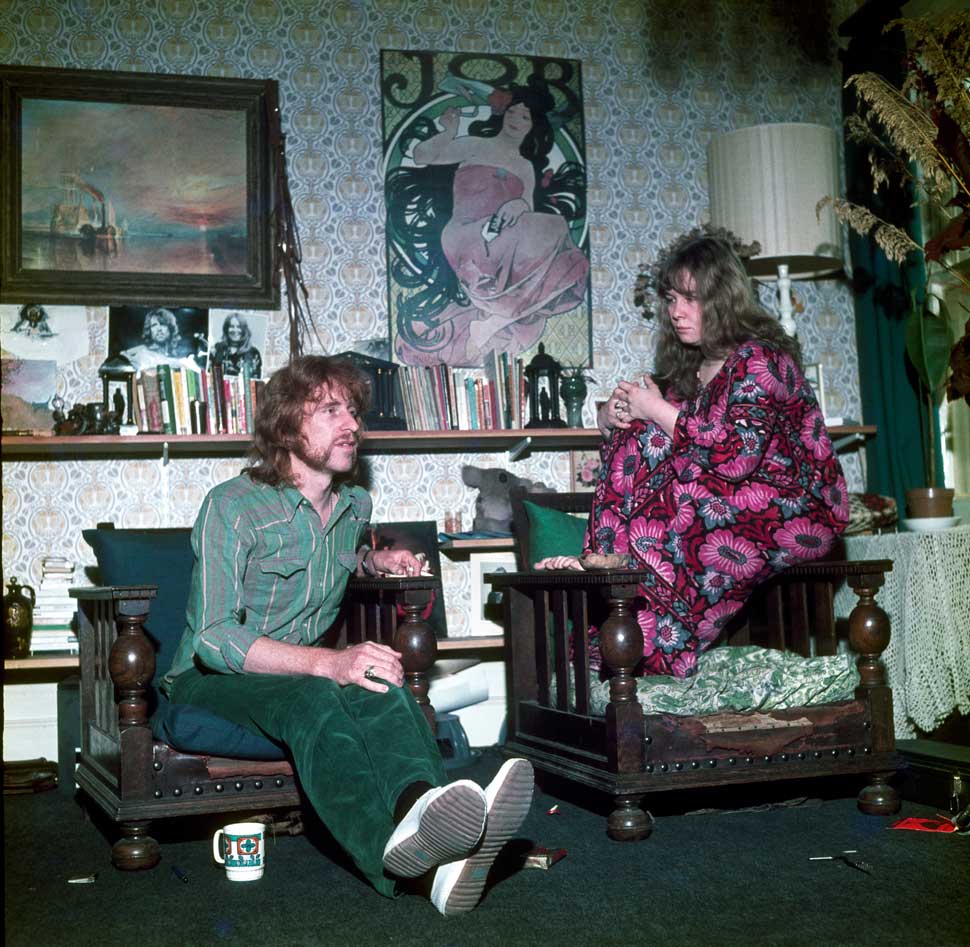
Back in Byfield, she began to have debilitating headaches. She was prescribed a painkiller, Distalgesic, that when mixed with alcohol can have potentially fatal side effects.
Whatever occurred during those next dark, desperate days, it was enough to convince Lucas to take Georgia away from her. On the morning of April 14 he boarded a plane to Melbourne with their baby, on a one-way ticket. That evening, a Thursday, a distraught Denny called a friend, Miranda Ward, who came to pick her up and drive her back to London.
The two spent the weekend at Ward’s flat. On the Monday morning, Ward went to work. She had arranged a doctor’s appointment for Denny for later that same afternoon and left a note, promising to return in time. Ward had also asked a friend, Jon Cole, to look in on her. When Cole arrived at the flat, he found Denny unconscious at the foot of the stairs. She was rushed to hospital in a coma. When her condition didn’t improve, she was transferred to one that specialised in brain injuries.
Days after arriving at his parents’ house in Melbourne, Lucas flew back to London. Arriving at the hospital, he was told his wife was brain dead and was asked for his permission to have her life support turned off. In the event, Denny died naturally on April 21, 1978. She was 31. The coroner’s report recorded her death as a ‘traumatic mid-brain haemorrhage. Accidental.’
In the years since Sandy Denny’s death, her recorded works have been reissued, remastered and re-evaluated. Today there is a more general awareness of her wonderful talent and the extent of her influence. In life she was unable to get out of the black pit she fell into; in death her light is undimmed.
“No one came anywhere near Sandy. She was the best,” says Ashley Hutchings. “She just had that very special quality when she sang a beautiful song. It broke your heart.”
This feature originally appeared in Classic Rock 248.
Paul Rees been a professional writer and journalist for more than 20 years. He was Editor-in-Chief of the music magazines Q and Kerrang! for a total of 13 years and during that period interviewed everyone from Sir Paul McCartney, Madonna and Bruce Springsteen to Noel Gallagher, Adele and Take That. His work has also been published in the Sunday Times, the Telegraph, the Independent, the Evening Standard, the Sunday Express, Classic Rock, Outdoor Fitness, When Saturday Comes and a range of international periodicals.

